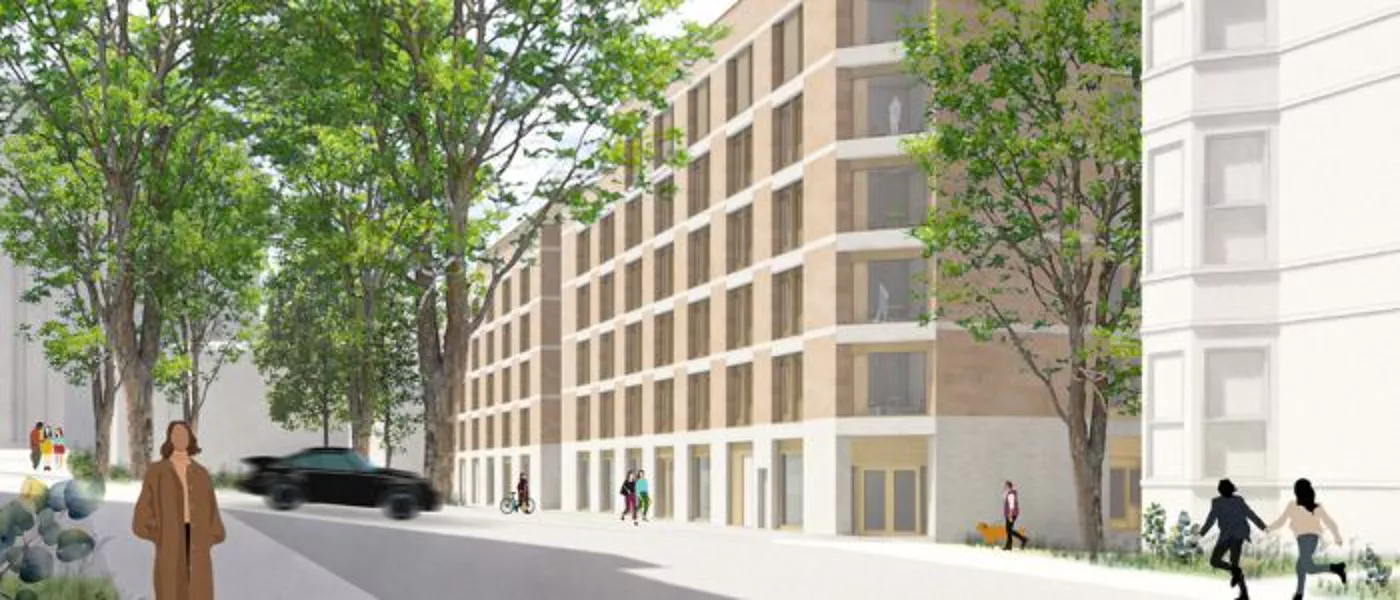
THE principles of tenemental living could be the key to meeting the academic and social needs of the modern-day student, a senior project manager from the University of Glasgow has told Project Scotland as the learning institute presses ahead with plans for a purpose-built student accommodation development in the style of a traditional Glasgow tenement.
The 260-bed complex is earmarked to be built on Lilybank Gardens, located at the northwest corner of the university’s Gilmorehill Campus in Glasgow’s west end. Previously characterised by tenements and townhouses in the 20th century, the site – which is owned by the university – now operates as a car park managed by Glasgow City Council under a lease agreement.

Intended to help ease an estimated shortfall of over 6,000 student beds in Glasgow, the build also aims to bring scholars closer to the university to create a better balance between learning, earning, and enjoying student life.
The design principle looks to pay homage to the historic homes that once stood on the site, allowing the development to link in with the surrounding tenements, townhouses, and active lane culture.
“It’s really important (to pay tribute to Glasgow’s heritage),” Nicola Cameron, the university’s director of property joint ventures, told Project Scotland. “We are the University of Glasgow; we occupy this space in the west end and the west end has a language all of its own – it’s the lanes, the tenements; it has a really special feel, and we wanted our newbuild accommodation to reflect that.”
The development’s design is not only inspired by the timeless aesthetic of Glasgow tenements, but also the community that such living accommodation naturally allows for – with the university believing it will benefit increased flexible group working and help students as they transition into the professional world.

”The role of the university is to support all aspects of the student journey with accommodation being a key touch-point in the life of as student,” Nicola added. “The design of our Purpose-Built Student Accommodation at Lilybank Gardens has been developed to enhance our future students’ experience, going beyond providing a place to sleep; it creates a supportive and conducive environment for academic attainment, personal growth, wellbeing and readiness to become impactful global citizens.
“What’s important to us is that sense of tenemental living. You know the people in your flat, on your landing, in your close, because that’s how you start to build relationships and networks. We’ve incorporated that into our new accommodation design to really build those networks and neighbourhoods with the hope also that our students know they’re in Glasgow, fall in love with Glasgow, and hopefully make Glasgow their forever home.”
Adding that university life is ‘so much more’ than just securing a degree, Nicola explained the other skills students will gain from tenemental living feeds into the learning institute’s philosophy of creating scholars that can be impactful citizens wherever they end up.
“I think if you’ve got a really wide-ranging international population, you need to create the spaces where people can come together and make friends and build their networks,” she explained. “These are the networks that will take you through the rest of your careers, and once you’ve left university these are often the people you come across as you go through your career, so it’s important to have spaces that facilitate that and help our students to really engage with the campus, community, and with the west end and wider Glasgow.”
Featuring active ground-floor spaces, the development aims to complement pedestrian pathways through the creation of a transition between Ashton Lane and Cresswell Lane with the Lilybank Gardens area tipped to become a lively space for all to enjoy.
The inclusion of the wider Glasgow community has been a pivotal part of the university’s campus masterplan.
“We want our students to fully experience Glasgow – the people, the architecture, the joys,” Nicola added. “We want them to be curious about leaving the west end and investigate the rest of everything about Glasgow – so having the wider community in and around our campus very much sparks that curiosity to discover more.”
After launching the plans at a public display on January 13, the university will now host a community engagement event on February 10 whilst working ‘very closely’ with Glasgow City Council to go through responses in the hope of submitting a planning application in spring.
The plans for Lilybank Gardens come as the university presses ahead with the £300 million build of the Keystone Building at its west end campus, which once completed in 2028 will be the fifth major building to be constructed through its £1.3 billion campus development programme.
Spanning 27,000 square metres, it will be the second largest building on the campus by size, and will accommodate around 3,700 students.
Further to this is the university‘s Church Street student accommodation development, also scheduled for completion in 2028, which will see the build of 480 student beds and further support the vision of a 24/7 campus.








